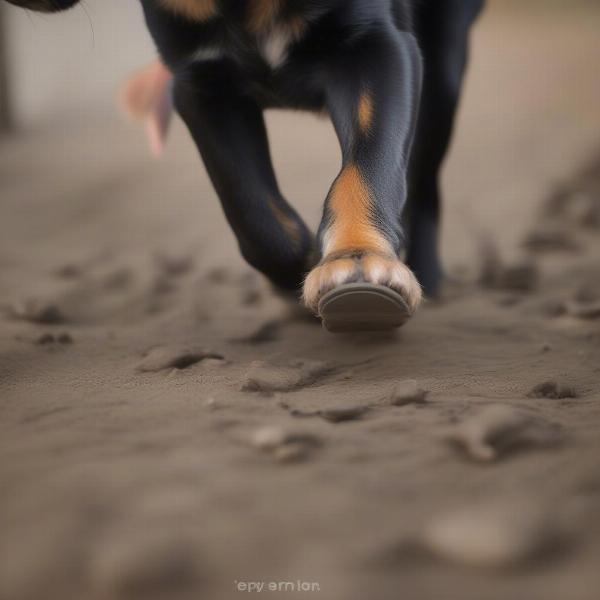Protecting your dog’s paws and preventing slips and falls on hardwood floors is crucial for their safety and well-being. Shoes for dogs designed specifically for hardwood floors offer a practical and effective solution. This comprehensive guide will explore the benefits, types, fitting process, and care tips for dog shoes, helping you make the best choice for your furry friend.
Why Your Dog Needs Shoes on Hardwood Floors
Hardwood floors, while aesthetically pleasing, can be treacherous for dogs, especially puppies and senior dogs. The smooth surface can cause slipping, leading to injuries like hip dysplasia, joint problems, or even broken bones. Shoes provide traction, stability, and confidence, allowing your dog to move freely without fear of slipping.
Furthermore, shoes protect paws from extreme temperatures, harsh chemicals in cleaning products, and allergens. During winter, cold floors can be uncomfortable, and in summer, they can become scorching hot. Shoes offer insulation and protect delicate paw pads.  Dog paws protected by shoes
Dog paws protected by shoes
Choosing the Right Shoes for Your Dog
Selecting the right shoes involves considering several factors. Size, material, and design play a crucial role in ensuring a comfortable and secure fit.
Sizing and Fit
Measure your dog’s paws accurately to determine the correct size. Most brands provide sizing charts, and it’s always better to choose a slightly larger size than too small. Ensure a snug fit that allows for natural paw movement. [dog-paw-measurement|Measuring dog paw|Image demonstrating the correct way to measure a dog’s paw using a tape measure or ruler, highlighting the importance of accurate measurements for proper shoe fitting.]
Materials and Design
Dog shoes come in various materials, including rubber, mesh, and leather. Rubber soles offer excellent grip on hardwood floors. Mesh provides breathability, while leather offers durability and protection. Consider the season and your dog’s activity level when choosing the material. Opt for breathable materials for warmer weather and waterproof options for rainy days.
Getting Your Dog Used to Wearing Shoes
Introducing shoes to your dog requires patience and positive reinforcement. Start by letting them sniff and investigate the shoes. Gradually introduce them to wearing the shoes for short periods, rewarding them with treats and praise. Make it a positive experience to build a positive association with wearing shoes.
Caring for Dog Shoes
Regular cleaning and maintenance will prolong the lifespan of your dog’s shoes. Most dog shoes are washable, either by hand or in a washing machine. Follow the manufacturer’s instructions for cleaning and drying. Inspect the shoes regularly for wear and tear and replace them when necessary.
Are Dog Socks a Good Alternative?
While dog socks with grip can provide some traction, they are not as effective as shoes in providing overall protection and stability on hardwood floors. dog socks with grip Socks offer less support and may not be suitable for all dogs, especially those prone to slipping. For optimal protection and safety, shoes are the recommended choice.
Conclusion
Shoes for dogs for hardwood floors are a valuable investment in your dog’s health and well-being. They provide essential traction, protect paws, and offer peace of mind knowing your dog can navigate slippery surfaces safely. Choosing the right shoes and introducing them gradually will ensure your furry companion enjoys the benefits of comfortable and secure footwear.
FAQ
- How often should I replace my dog’s shoes? Replace them when they show signs of wear and tear, such as worn-out soles or damaged fabric.
- Can my dog wear shoes all day? It’s best to limit shoe-wearing time to when it’s necessary, such as on walks or when on hardwood floors.
- What if my dog chews on their shoes? Choose durable, chew-resistant materials and monitor your dog while they wear shoes.
- Are there different types of shoes for different activities? Yes, some shoes are designed for specific activities like hiking or winter weather.
- Can shoes help with my dog’s anxiety on slippery surfaces? Yes, shoes can provide a sense of security and stability, reducing anxiety on slippery floors.
- Do all dogs need shoes on hardwood floors? While not all dogs require shoes, they are especially beneficial for puppies, senior dogs, and dogs with mobility issues.
- How can I clean my dog’s shoes? Follow the manufacturer’s instructions, as most shoes are hand-washable or machine-washable.
ILM Dog is your trusted source for expert advice on dog care and well-being. We offer a wealth of information on dog breeds, health, training, nutrition, and much more. From choosing the right breed to providing the best care for your senior dog, ILM Dog is here to help you every step of the way. Contact us at [email protected] or +44 20-3965-8624 for expert guidance.